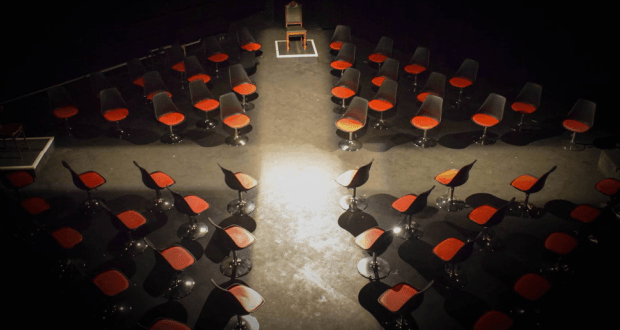This innovative production is very well suited to the intimate tent setting of the Pleasance Courtyard’s Green Venue, designed as it is for theatre-in-the-round. The production appealed to me in terms of its interactive billing as a ‘360 degree swivel-seat experience’, where the audience have some autonomy of decision over their view of the play by moving their chairs. This ‘choose your own view’ element cleverly underscores the themes of the piece, a taut and stylised narrative exploring two crumbling marriages, where the view that each character takes is in itself skewed and faulty. This piece however has much more than novel use of swivel chairs going for it; it is delightfully and incredibly precisely choreographed by director Kathleen Douglas to show that the two relationships, different in many ways, share very human and realistic similarities. This is achieved too through Andrew Bovell’s sharp writing, encompassing ensemble speaking, repeated dialogue delivered with subtle tonal changes that speak volumes about subtext, and clever word-play presenting multiple perspectives as both marriages falter at the feet of affairs.
The pace of the piece and commitment of the performers made for an absorbing experience, with each character communicated with integrity, and I was particularly gripped by Phil Aizelwood’s portrayal of Leon, a seemingly high-status police officer hiding a raft of insecurities. There is a raw and visceral sense of truth pulsating throughout, even in the tongue in cheek sequence of the two husbands accidentally meeting in a pub, football blaring away on a giant screen. The concept of ‘truth in comedy’ is proved never truer than here, a parody of male posturing as a thin veil to hide immense inner turmoil. The female characters are explored in equally keen detail, finding themselves meeting in what appears to be a seedy pic- up joint, their conversation tinged with concerns about their supposedly fading looks and desirability that is at once as painful as it is easy to relate to.
The use of space and proxemics is a particularly interesting component, for as the in-the-round staging is full of audience chairs, the actors must move around the outskirts with very specific steps, occasionally using the central space traverse-style, sometimes mirroring the gestures of their opposite number exactly, whilst layering an entirely different meaning or emotion upon them. This juxtaposition is startling and often deeply affecting, making for a fascinating deconstruction of the characters, their relationships and the notion of human fallibility. This in itself was enough for me, the microscopic analysis of these people was so real and fraut that little more was needed. However, layered over the top of this was a narrative about a woman who was missing, perhaps murdered. This I found quite hard to fathom in its entirety, and the ending of the piece seemed to hinge on this sub plot, perhaps to parallel what had happened in the two relationships, but unfortunately I rather failed to grasp the conclusion. This may of course have been intentional, as this is a two part-narrative, with audiences invited back to see a second performance entitled ‘The Truth’. This device, and indeed the quality and immersive experience of the piece certainly encourages me to see more!

